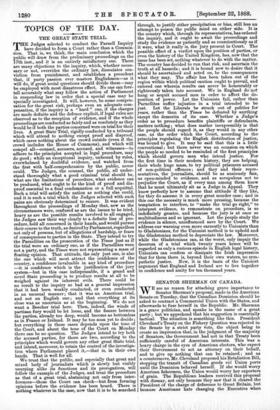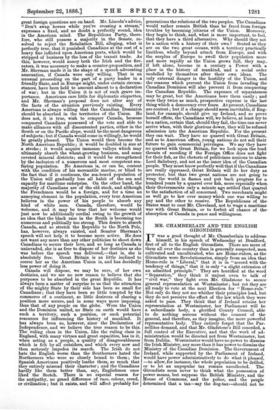SENATOR SHERMAN ON CANADA.
WE see no reason for attaching grave importance to Senator Sherman's proposal, made in the American Senate on Tuesday, that the Canadian Dominion should be asked to contract a Commercial Union with the States, and afterwards to fuse herself in the Republic. Mr. Sherman is a grave politician, and speaks in the name of a great party ; but we apprehend that his suggestion is essentially tactical. The situation is something like this. President Cleveland's Treaty on the Fishery Question was rejected in the Senate by a strict party vote, the object being to create an impression that, in the judgment of the majority of Senators, the Government had not in that Treaty been sufficiently careful of American interests. This was a. heavy charge in the eyes of American electors, who expect their Government to act as attorney on their behalf, and to give up nothing that can be retained ; and as a countermove, Mr. Cleveland proposed his Retaliation Bill, stopping the transit of Canadian goods via Union ports until the Dominion behaved herself. If she would worry American fishermen, the Union would worry her exporters of grain. The Republican leaders received this proposal with dismay, not only because they saw that it cleared the President of the charge of deference to Great Britain, but because Americans hate changing the Executive when great foreign questions are on hand. Mr. Lincoln's advice, " Don't swap horses while you're crossing a stream," expresses a fixed, and no doubt a perfectly sound, idea in the American mind. The Republican Party, there- fore, who still possess a, majority in the Senate, re- solved to reject the Retaliation Bill, alleging, what is perfectly true, that it punished. Canadians at the cost of a heavy fine inflicted upon American ports, which would be stripped of business by the loss of the transit trade. As this, however, would annoy both the Irish and the fire- eaters, it was necessary to make a counter-proposition, and Mr. Sherman made it in the shape of a speech advocating annexation, if Canada, were only willing. That is an unusual proceeding on the part of a party leader in a friendly State, and in Europe might, under certain circum- stances, have been held to amount almost to a declaration of war; but in the Union it is not of such grave im- portance. Americans care little for diplomatic etiquettes, and Mr. Sherman's proposal does not alter any of the facts of the situation previously existing. Every American is always willing that the Canadian Dominion should be absorbed in the territories of the Union. He does not, it is true, wish to conquer Canada, because conquered Canadians possessed of the vote and able to make alliances with all discontented. parties, either in the South or on the Pacific slope, would be the most dangerous of subjects ; but if Canada would come in willingly, he would. be greatly pleased. The Union would then become the North American Republic ; it would be doubled in size at a stroke ; it would acquire immense valleys which may ultimately absorb the wheat-growing business, and some coveted mineral districts; and it would. be strengthened by the inclusion of a numerous and most competent sea- faring population. No American is, or can be, content with the condition of his mercantile marine, or blind to the fact that if it continues, the sea-board population of the Union will gradually lose all habit of the sea and capacity for maritime enterprise. On the other hand, the majority of Canadians are of the old stock, and although the Frenchmen would be a foreign, and for a time an annoying element in the population, every true American believes in the power of his people to absorb any kind of white men. Canada, therefore, would be welcome, and it may be true that her welcome would. just now be additionally cordial owing to the growth of an idea that the black race in the South is becoming too numerous and politically too strong. This desire to absorb Canada, and so stretch the Republic to the North Pole, has, however, always existed, and Senator Sherman's speech will not help it to become more active. He does not want any more than any other politician to shoot down Canadians to secure their love, and so long as Canada is uninvaded, she is as free to dispose of her destinies as she was before the speech was delivered,—that is, she is absolutely free. Great Britain is as little inclined to coerce her as the American Union is, and has decidedly less power of doing it.
Canada will dispose, we may be sure, of her own destinies, and we see no new reason to believe that she purposes to be absorbed. in the great Republic. It has always been a matter of surprise to us that the attraction of the mighty State by their side has been so small for Canadians ; that they have been so little tempted by the commerce of a continent, so little desirous of sharing a position more secure, and in some ways more imposing, than that of any people on the globe. Were the Union and the Dominion united, no State on earth would have such a territory, such a position, or such potential resources for influencing the history of mankind. It has always been so, however, since the Declaration of Independence, and we believe the true reason to be this. The ruling class in the Union, like the ruling class in England, with many virtues and great capacities, has in it, when acting as a people, a quality of disagreeableness which is felt by all outsiders, and which every now and then seriously impedes its march. The Irish do not hate the English worse than the Southerners hated the Northerners who were so closely bound. to them; the Spanish Americans positively loathe them, so much that they entirely misread their character ; and the Canadians hardly like them better than, say, Englishmen once liked the Scotch. There is no especial reason for the antipathy, no grand difference of race, colour, creed, or civilisation ; but it exists, and will affect probably for generations the relations of the two peoples. The Canadians would rather remain British than be freed from foreign troubles by becoming :citizens of the Union. Moreover, they begin to think, and, what is more important, to feel, that they have a third alternative. Why should they not be a nation with a history of their own ? Seated as they are on the two great oceans, with a territory practically limitless, wholly beyond. attack from Europe, and with the surplus of Europe to swell their population more and more rapidly as the Union grows full, they may, if left alone, become in a century a Power with a place in the history of mankind, and a social order modelled by themselves after their own ideas. The only external danger is the hostility of the Union, and the reasons which prevent the Union from invading the Canadian Dominion will also prevent it from conquering the Canadian Republic. The expenses of separateness may be great, but the Americans bore them easily ; and were they twice as much, prospective expense is the last thing which a democracy ever fears. At present, Canadians are content ; but if a change should seem inevitable, if Eng- land, for example, should give up Ireland, and so prove herself effete, the Canadians will, we believe, at least try to be a nation, certain that, should they fail, the time can never arrive when, with their glorious dower, they will be refused admission into the American Republic. For the present they can wait. They have no quarrel with Great Britain, and as to American offers, young nations do not sell their future to gain commercial privileges. We say they have no quarrel with Great Britain, for we look upon the loud threats of seceding if the Foreign Office does not fight for their fish, as the rhetoric of politicians anxious to alarm Lord Salisbury, and not as the inner idea of the Canadian people. They must know perfectly well that if the Canadians are really oppressed, Great Britain will do her duty as. protector, but that two great nations are not going to. wrap the world in flames and put back progress for a hundred. years by a quarrel over fish, more especially when. their Governments only a minute ago settled that quarrel to the satisfaction of all concerned. Two merchants might as well go to law over money which one was willing to. pay and the other to receive. The Republicans of the States want to oust Mr. Cleveland, not to wage a maritime war with Great Britain, or to forfeit all chance of the absorption of Canada in peace and willingness.



































 Previous page
Previous page